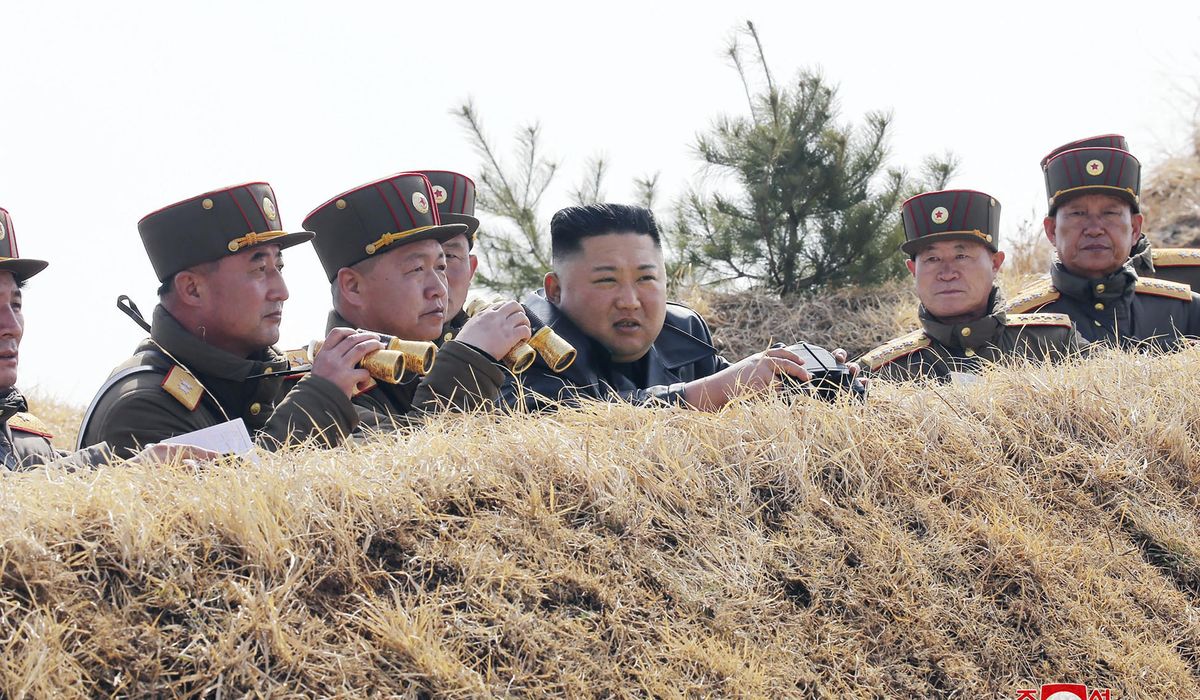The coronavirus pandemic has put many of President Trump’s signature foreign policy initiatives in quarantine, locking down a string of hoped-for election-year breakthroughs even as China has aggressively used the crisis to elevate its own status on the world stage.
With the White House now consumed by one of the most daunting public health crises in history, prospects for diplomacy on North Korea nuclear talks, the Taliban peace deal, trade agreements and the maximum pressure campaign against Iran have more questions than answers.
The image of a world forced to shelter in place was on display vividly last week when the Group of Seven leading industrial nations scrapped its annual June summit in favor of a teleconference — a nod to the new reality of “social distancing” in global diplomacy.
The shift was made to allow “each country to focus all of its resources on responding to the health and economic challenges of COVID-19,” a White House spokesman told reporters.
U.S. officials insist they can operate behind the scenes on those and other fronts, including Mr. Trump’s “deal of the century” Israeli-Palestinian peace plan, the “America First” pressure on allies to pay more for U.S. military protection and more. But few dispute how all of those issues, let alone the pursuit of a next-phase U.S.-Chinese trade deal, have been pushed far down on the priority list indefinitely.
Some analysts warn that the administration will be hard-pressed to deal with the prospect of mounting global disruptions in the Middle East, Asia and beyond that could put U.S. national security under increasing threat.
“We shouldn’t expect our adversaries around the world to pause their hostilities. Quite the opposite: upticks in cyberattacks, missile strikes in Iraq and more suggest they may seek to take advantage of the situation,” said retired Air Force Gen. Charles Dunlap, now the executive director of the Center on Law, Ethics and National Security at Duke University.
“With respect to nation-states, history shows that when regimes come under internal stress, they will sometimes lash out externally in the hope of drawing people’s attention away from their domestic woes,” Mr. Dunlap told The Washington Times.
North Korea’s hermetic regime, for example, was hard to read even before the new coronavirus outbreak. With concern running high that the regime of Kim Jong-un is covering up a massive outbreak, some argue that Pyongyang will be even less willing to move ahead with President Trump’s unprecedented personal diplomatic outreach.
“I fear that if [North Korea] is suffering from an outbreak, it will only harden its positions and it will shift its nuclear blackmail diplomacy from trying to gain political and economic concessions to warnings of stay out of North Korean business and do not meddle in [North] Korean affairs,” said David Maxwell, a North Korea analyst with the Foundation for Defense of Democracies.
China on the march?
Foreign policy analysts are focused even more squarely on China, the source of the pandemic, which is now touting its belated success in curbing the spread of the COVID-19 virus.
With state media repeatedly highlighting the aid Beijing is giving to Italy, Iran and other hard-hit countries, the communist regime is scrambling to make the argument that China, not the United States, is leading the coordinated global response.
“This is a crisis likely of historical proportions that has the potential to rapidly change geopolitics around the world,” said Abraham M. Denmark, head of the Asia Program at the Woodrow Wilson International Center for Scholars.
On a conference call Thursday, he noted how critical events can transform competition between great powers. He pointed to the 1956 Suez Canal crisis, which symbolized the eclipse of the British Empire and the cementing of the U.S. as the world’s dominant power.
“While the coronavirus could be an opportunity for galvanizing international response,” he said, “so far that hasn’t been happening. What we have seen is great-power competition that had already been accelerating over the past several years in some ways kick into overdrive.”
“We’ve seen China attempt to establish itself as a leader in a global response to the coronavirus, [while] the United States has struggled mightily to protect its own people, let alone drive a unified international response and provide public goods,” Mr. Denmark said. “The result is an effort by Beijing to muddy the waters about the origins of this virus while at the same time portraying itself as an ascendant global leader, juxtaposed to a United States in decline.”
Robert Daly, who heads the Wilson Center’s Kissinger Institute, said the Chinese are acting with big ambitions.
“China is very aware that at the end of World War II, because the United States was the only country that had anything in the way of productive capacity — through the Marshall Plan — the United States was able to use its industrial strength to supply the world and build power,” he said.
“Is this China’s moment to do the same?” Mr. Daly asked. “They’re making moves that suggest they may think that it is.”
Obama administration East Asian official Kurt M. Campbell and Brookings Institution scholar Rush Doshi went further. They warned that the Trump administration’s handling of the COVID-19 crisis is playing right into Beijing’s hands.
“Internationally, the pandemic has amplified Trump’s instincts to go it alone and exposed just how unprepared Washington is to lead a global response,” the two wrote in Foreign Affairs. The pandemic is “testing” U.S. leadership globally and “so far, Washington is failing the test.”
By contrast, they said, Beijing has “undertaken a robust diplomatic campaign” by engaging European and Pacific states and others across Africa and Asia to share information about the pandemic and lessons from China’s own battle with the disease.
Given the origins of the virus and Beijing’s widely criticized handling in the early days of the outbreak, “the sheer chutzpah of China’s move is hard to overstate,” Mr. Campbell and Mr. Doshi wrote.
Top U.S. officials have harshly rejected the idea that Beijing is playing a constructive role in the fight against the pandemic. Secretary of State Mike Pompeo said Friday that China failed to explain the early days of the outbreak and exactly what Beijing knew and when.
“We need to know immediately. The world is entitled to know,” Mr. Pompeo said at the White House. “The Chinese government was the first to know of this risk to the world, and that puts a special obligation to make sure the data gets to our scientists, our professionals.”
Aid push
Even as the Trump administration deals with a worsening situation at home, U.S. diplomats say they are working overtime to provide medical supplies and other aid to countries around the world, with USAID and other agencies seeking to drive a global response.
“USAID has committed nearly $100 million in emergency funds for countries affected by COVID-19,” David Schenker, an assistant secretary at the State Department’s Bureau of Near Eastern Affairs, told reporters Friday.
The aid is being channeled through the World Health Organization, said Mr. Schenker, and the U.S. Defense Threat Reduction Agency is delivering testing kits, particularly to Iraq.
U.S. diplomats remain posted at embassies around the world, although the State Department in recent days announced an unprecedented suspension of routine visa services in most countries.
Other aspects of U.S. “soft power” are taking a hit.
The Peace Corps said last week that it had temporarily suspended all global operations and was evacuating more than 7,300 volunteers from 61 countries.
Analysts are more concerned about hard-power projection — the view that American military might is what most prominently undergirds U.S. foreign policy, even in the Trump era of attempted disentanglement from foreign “forever wars.”
In the post 9/11 era, the U.S. has eagerly sought to help allies in Asia, the Middle East and elsewhere share the security burden, particularly in the counterterrorism and regional security realms, but big questions now loom over the sustainability of that paradigm.
The Pentagon last week announced a temporary suspension of training activities with Iraqi security forces and pulled back from a base near the Syrian border. U.S. Africa Command canceled or postponed three major military exercises at a time of growing concern about radical Islamist movements on the continent.
Military officials insist the cancellations do not mean a reduction in U.S. commitments.
“We may reduce in scope the size or cancel an exercise, but we will continue to lean forward to make sure troops in Africa have what they need,” AFRICOM Commander Gen. Stephen J. Townsend said in a statement.
A hit to mobility
The virus’ potential spread within the U.S. military’s ranks is likely to hinder rather than accelerate the movement of personnel around the world.
That is having an immediate impact on a major Trump foreign policy goal: a peace deal with the Taliban that would allow U.S. combat forces to finally leave Afghanistan.
U.S. Central Command, which oversees operations in Afghanistan, on Friday issued a 14-day “stop movement” on all American forces headed to or leaving the region.
The Taliban and U.S.-backed government in Kabul were supposed to begin direct peace talks last week, but that was put on hold as well in part because of the uncertainty caused by the virus crisis. It is not clear whether the Taliban will walk away from the pact if the U.S. drawdown slows or stops entirely as a result of the pandemic.
Pentagon officials say they are still planning a U.S. troop withdrawal. The “stop movement” order is “not expected to delay the drawdown in forces from Afghanistan as part of the U.S. agreement with the Taliban,” CENTCOM said in a statement Friday.
The virus and Iran
On another front are concerns about how the Trump administration’s bare-knuckle pressure campaign against Iran will fare over the coming weeks and months.
Iran has been one of the nations hit hardest by the pandemic, and the White House and State Department have sought to walk a fine line between maintaining the economic and military pressure campaign while acknowledging massive humanitarian concerns not only in Iran, but also across the wider Middle East.
Despite the public health disaster inside Iran, Tehran-backed militias are carrying out attacks on U.S. troops stationed inside Iraq.
Iran’s state-controlled media have produced a flood of stories condemning the U.S. sanctions, urging European nations to ignore the trade restrictions and saying Washington is responsible for Iran’s public health crisis.
Iranian President Hassan Rouhani called in an “open letter” to the American people released Friday for an “end to the dark chapter in American history.”
“The Iranian people are harmed by both the deadly coronavirus and the callous U.S. government policy of economic terrorism inflicted on them,” Mr. Rouhani wrote. “Yet, even under the circumstances of the pandemic, the U.S. government has failed to abandon its malicious policy of maximum pressure and is thus in practice aiding the spread of this virus with its sanctions.”
NBC News reported Thursday that Mr. Trump decided against strikes on Kata’ib Hezbollah, a powerful Iran-backed militia inside Iraq, because of fears that it could make the U.S. look heartless and cruel in light of the pandemic.
On Friday, top administration officials warned Iran against encouraging or sponsoring those attacks. At the same time, Mr. Pompeo made clear that U.S. economic sanctions on Iran do not preclude the delivery of desperately needed aid.
“There is no sanction on medicines going into Iran,” he said.



















